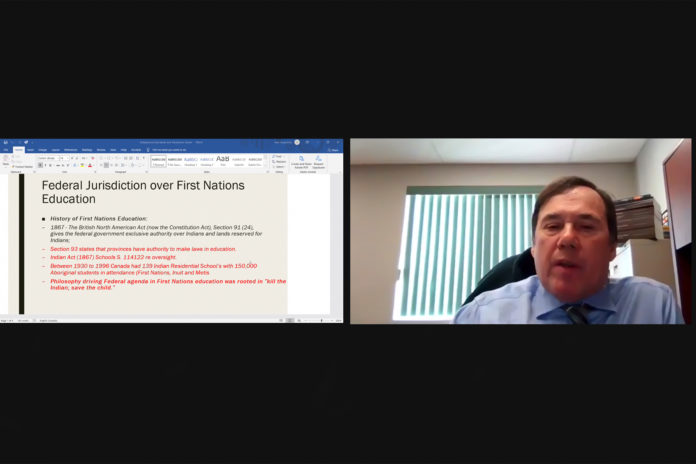

St. Thomas University’s Indigenous Students’ Reconciliation Committee hosted Ivan Augustine for the second part of their four-week speaker series on March 11. Augustine, an Indian day school survivor, focused his presentation on Indian day schools and residential schools.
Augustine, the director of education at Elsipogtog, said in an interview with The Aquinian after the event that there were good memories, like unlimited school biscuits, powdered milk and playing with hockey sticks. But he also remembers the bad, like the strappings and abuse.
He remembers not being allowed to speak Mi’kmaq and being punished for “resisting to participate.”
“In your mind, you’re thinking of how to say it and that takes a little while and then, you’re yelled at or you’re hit on the back of the head,” said Augustine. “It was just not a good learning environment at all.”
The Indigenous Education and Awareness series event began with Tiger Levi and Jonah Simon, co-chairs of the newly formed reconciliation committee, outlining the event.
Augustine, who is a STU alumni, said Indian day schools were the government’s role in assimilating First Nations kids into a predominantly white society.
Augustine said it’s important to understand that Indian day Schools and residential schools were under federal jurisdiction. First Nations education has been under the policy of assimilation since the 1930s.
“There’s a written policy out there by the government, in the 1920s or 1930s, that states ‘we’re gonna educate the Indian out of the Indian,’” he said. “The federal government has played in inefficiently and ineffectively educating First Nations children.”
Levi, chair of the Indigenous Students Reconciliation Committee and second-year STU student, said this event aimed to provide information to educate and make the public aware of what may not be easily accessible to them, making decolonization easier to achieve. In late November, Levi was appointed as the Indigenous representative on STU’s Students’ Union, which came with the responsibility of bringing the reconciliation committee back to life.
“To my knowledge, the committee always existed, but was never touched. [It] was always kind of left in the backroom and once I got the opportunity – I jumped,” said Levi. “We’re trying to set a solid foundation for years to come to keep this community growing and growing.”
He said he looks forward to the last two parts of the speaker series – continuing on education: past and current students talking about their experience at STU followed by missing and murdered Indigenous women, girls, and two-spirit.
As a member of the Three Nations Education Executive Committee, Augustine said they have taken many steps forward, specifically with the Regional Education agreements. The REA is a new approach to the funding of First Nations K-12, formed by the Assembly of First Nations to respect First Nations control of education.
The funding will supply the specific needs for students, fund First Nations elementary and secondary education, and additional funding for culture and language studies.
“This is exactly how we’re going to make the difference.”
Augustine said ending this ongoing marginalization begins with accountability. He said if the premier made courses and curriculum on First Nations issues and history mandatory in public schools, that would show they are being accountable.
“In order for us to get rid of systemic racism, discrimination and so on, we have to educate it out of the system.”
